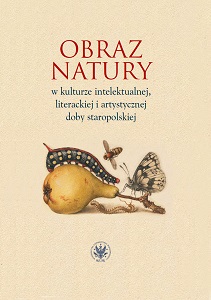Natura naturata i natura naturans – komplementarność czy koincydencja? Strategie poetyckie doby renesansu i baroku: rekonesans
Natura Naturata and Natura Naturans – Complementarity or Coincidence? Poetic Strategies in Renaissance and Baroque – Reconaissance
Author(s): Marek Prejs
Subject(s): Cultural history, Studies of Literature, Theory of Literature
Published by: Wydawnictwa Uniwersytetu Warszawskiego
Keywords: poetic strategies; natura naturata; complementarity; coincidence; Renaissance literature; Baroque literature; Kochanowski; Rej; cycles of nature; perpetual metamorphosis; mechanistic utopia
Summary/Abstract: The dissertation analyses poetic strategies aiming to establish two levels of reality in the created picture of the world (natura naturata and natura naturans) and discusses the most characteristic models of building the relations between both spheres. Such relations defined as “complementarity” and “coincidence” are equally relevant to Renaissance and Baroque, and the main dividing line in Polish literary tradition does not run between the periods but between the poetry of Jan Kochanowski and Mikołaj Rej. The Renaissance writers build “the whole earthly circle” (a three-dimensional space which is subjectively created) through overlapping the rhythm of human existence and the cycles of nature, which is to prove the all-embracing, cosmic strength of neo-platonic love. A specific type of poetic imagery, focused on processuality and typicality, supports such a poetic structure. When this common rhythm is distorted due to a natural disaster or a human tragedy, poetic images become sensually concrete. This model, adopted by the Baroque poets mainly from Mikołaj Rej, becomes more sensually detailed, substituting stability with the rule of perpetual metamorphosis, which may result in divine reality “slipping” to “nature created” – beautiful but transient.(Hieronim Morsztyn). To prevent it and stabilise the image of the Creator, poetry has to appeal to the mechanistic utopia of “the world as a clock wound once by God” (Wacław Potocki, Elżbieta Drużbacka).
Book: Obraz natury w kulturze intelektualnej, literackiej i artystycznej doby staropolskiej
- Page Range: 274-287
- Page Count: 14
- Publication Year: 2020
- Language: Polish
- Content File-PDF

